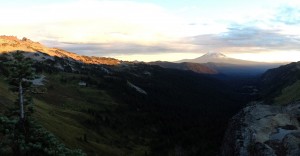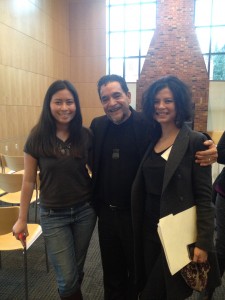Late one night, five friends and I walked out of Trimble Hall with a light-up Frisbee. We formed a circle on Todd Field under the clear sky, while the dew on the grass kissed our ankles. I turned on the lights of the Frisbee and threw it. While we tossed the disc between us, a plane flew overhead with a rumble that caused the trees to shiver.
If on that clear night a passenger in a window-seat looked down, then she might have seen a speck of light flying across the grass. She might have followed this light as it zigzagged between six points in an indistinct circle. And she might have woken the man sleeping next to her to point out the roving speck of light; but by then, the plane would have passed and the light would have been lost.
After about an hour, we sit and watch the stars. We search for constellations, make up our own. The sky is full of stars.
This year has been filled with memories, moments to keep, each one a star in the night. I have stood on a hill watching fireworks shoot into the air. I have thrown a Frisbee around with friends more times than I can count. I have been to the Sound on multiple occasions, and have each time taken with me something special. I have said goodbye to a friend who decided that he would be better off at home, and watched him succeed there. Most of all, I have taken the time to wonder at the night, the light, the planes and the cherry blossoms, the blue beyond the hills, and the stars.
After dinner on weekends, my friends sit around and talk, drinking tea and eating cookies. Sometimes, we’ll play a game of cards, or Clue, or Hangman. And we’ll think that two years have gone by fast—almost as fast as twenty years have gone by. We’ll remember the time we wandered, lost, around Tacoma in the rain. Or any one of the many nights that we sat around a table, laughing, talking. We’ll remember that night four semesters ago, when we sat in a study room in the library, staring at laptop screens or words on a page, unaware of who, to each other, we would become.
I examine my empty room and wonder how all of my things fit into three cardboard boxes. I’ll store them later on and dust my hands of them. The future looks bright. I trust in it.
Out of the corner of my eye, I see something that I’ve forgotten to pack. A light-up Frisbee, resting against the wall. Perhaps, I’ll see if my friends want to play outside for a bit. I don’t yet want to come to terms with the fact that I am halfway done with college.
Soon, I will board a plane headed for Honolulu. It will be dark when the plane takes off; when it passes over the university, I might see a small, almost imperceptible speck of light flying over the grass, like the beam of a flashlight searching the skies, or a firefly circling the sides of a glass jar in the night.
And I will think, It is well.
*
On my desk sits a trinket box that I once received as a gift. Printed across the box in white letters are the words, “Good friends are like stars you don’t always see them but you know they are always there.” A friend once pointed out that the sentence suffers from a lack of punctuation. This made me think, Good friends are like punctuation[;] you don’t always see them but you know they are always there.
I have been blessed with good friends and a good family, who have always been there. I would like to recognize them, as such. I would like to thank my professors, who have worked with me on every essay and prepared me for every exam, and who have nothing but encouragement and kind words for me at the end of each day. I would like to thank my bosses and co-workers for making work fun, and thus, for paying me to have fun. I would like to thank everyone who has read my blog; I know there are not a lot of you, but there are more of you than I could have wished for. Finally, I would like to congratulate my sister, who will be joining me at the University of Puget Sound in the fall.



